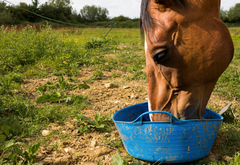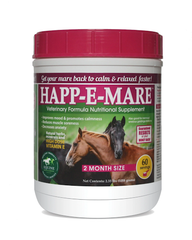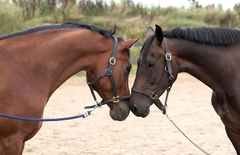Tips and Techniques for Handling Moody Mares

Moodiness in mares can present a significant challenge for horse owners, affecting both the well-being of the horse and the enjoyment of the equestrian experience. While mood swings in mares can be influenced by various factors, including hormones, environment, and individual temperament, there are several strategies that owners can employ to manage and address these mood fluctuations effectively. In this blog post, we'll explore practical tips and techniques for coping with and mitigating moodiness in mares.

Establish Consistent Routine and Environment:
Mares, like many animals, thrive on consistency and routine. Establishing a predictable schedule for feeding, turnout, exercise, and other activities can provide stability and reduce stress for your mare. Additionally, maintaining a calm and quiet environment in the barn and pasture can help minimize triggers for mood swings.
Provide Ample Turnout Time:
Adequate turnout time in a spacious paddock or pasture is essential for the physical and mental well-being of mares. Regular turnout allows horses to engage in natural behaviors, such as grazing and socializing, which can help alleviate stress and reduce moodiness. Aim for at least several hours of turnout per day, weather permitting.
Monitor Diet and Nutrition:
Diet plays a crucial role in the overall health and behavior of horses, including mares. Ensure that your mare's diet is well-balanced and provides all essential nutrients. Some mares may benefit from a diet low in sugar and starch, as excessive carbohydrates can contribute to mood swings and behavioral issues. Consult a veterinarian or equine nutritionist to develop an appropriate feeding plan for your mare. Employing specialized feeding techniques and targeted treatments can significantly improve their overall comfort and reduce anxiety levels:
- Slow-feeder hay nets quiet nervous horses – they have an all-day job. They also buffer stomach acid. Many nervous mares have upset stomachs.
- Ration balancers – these slow food out of the stomach with the extra protein in balance, so mares feel fuller longer. They are not as food-centric and reduce insulin surging.
- Deworm 2 X/yr – Equimax. This product kills bots in the stomach. Bots create huge holes in the stomach lining, which causes mares to be in pain and anxious.

At Equine Medical and Surgical Associates, we offer a specialized supplement to aid mare health and tranquility. Happ-E-Mare provides a natural solution to address the concerns of moodiness, anxiousness, irritability, and more. Crafted with a unique blend of 9 balancing herbs, high-dose Vitamin E, and essential minerals, it's formulated to support your mare's general well-being and serenity, especially during her reproductive cycles. Learn more on our website!
Regular Exercise and Mental Stimulation:
Adequate exercise is essential for managing moodiness in mares, as physical activity helps release pent-up energy and promotes relaxation. Incorporate regular riding sessions, lunging, or other forms of exercise into your mare's routine. Additionally, provide mental stimulation through enrichment activities, such as puzzle feeders or ground training exercises, to keep your mare engaged and content.
Use Positive Reinforcement Training:
Positive reinforcement training techniques can be highly effective in managing moodiness and improving behavior in mares. Reward desirable behaviors with treats, praise, or scratches to encourage your mare to repeat them. By focusing on positive reinforcement rather than punishment, you can build trust and confidence in your relationship with your mare.

Be Mindful of Hormonal Influences:
Hormonal fluctuations, particularly during estrus cycles, can exacerbate moodiness in mares. Keep track of your mare's estrus cycle and be prepared for potential changes in behavior during certain times of the month. While it's essential to be patient and understanding during these periods,veterinary-approved hormonal treatments are also available to help manage mood swings in mares.
Provide Adequate Socialization:
Horses are social animals that thrive on interaction with other equines. If possible, provide your mare with opportunities for socialization with compatible herd mates. Social interaction can help reduce stress and anxiety, leading to a more balanced and contented mare.
Address Underlying Health Issues:
Moodiness in mares can sometimes indicate underlying health issues, such as pain or discomfort. Regular veterinary check-ups and thorough physical examinations can help promptly identify and address health concerns. Addressing physical discomfort can often lead to improvements in behavior and temperament.
Practice Patience and Understanding:
Dealing with mood swings in mares requires patience, understanding, and empathy. Remember that each mare is unique, and what works for one may not necessarily work for another. Take the time to observe and understand your mare's individual temperament and behavior patterns, and adjust your management approach accordingly.
Managing moodiness in mares requires a combination of proactive management strategies, consistent care, and an understanding of individual needs. By implementing these tips and techniques, horse owners can help their mares lead happier, healthier, and more balanced lives. At Equine Medical and Surgical Associates, our mission is to maintain your mare's peak health year-round, ensuring she remains in top form as she accompanies you. Please visit our website and contact us for any additional questions or concerns!



















